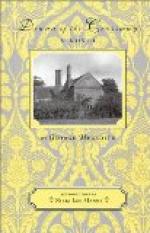A simple newspaper report of the expedition of a Nileboat party could stir the Powers to take her up and turn her on their wheel in this manner.
But others of the sons and daughters of London were regretting her prolonged absence. The great and exclusive Whitmonby, who had dined once at Lady Wathin’s table, and vowed never more to repeat that offence to his patience, lamented bitterly to Henry Wilmers that the sole woman worthy of sitting at a little Sunday evening dinner with the cream of the choicest men of the time was away wasting herself in that insane modern chase of the picturesque! He called her a perverted Celimene.
Redworth had less to regret than the rest of her male friends, as he was receiving at intervals pleasant descriptive letters, besides manuscript sheets of Antonia’s new piece of composition, to correct the proofs for the press, and he read them critically, he thought. He read them with a watchful eye to guard them from the critics. Antonia, whatever her faults as a writer, was not one of the order whose Muse is the Public Taste. She did at least draw her inspiration from herself, and there was much to be feared in her work, if a sale was the object. Otherwise Redworth’s highly critical perusal led him flatly to admire. This was like her, and that was like her, and here and there a phrase gave him the very play of her mouth, the flash of her eyes. Could he possibly wish, or bear, to, have anything altered? But she had reason to desire an extended sale of the work. Her aim, in the teeth of her independent style, was at the means of independence—a feminine method of attempting to conciliate contraries; and after despatching the last sheets to the printer, he meditated upon the several ways which might serve to, assist her; the main way running thus in his mind:—We have a work of genius. Genius is good for the public. What is good for the public should be recommended by




